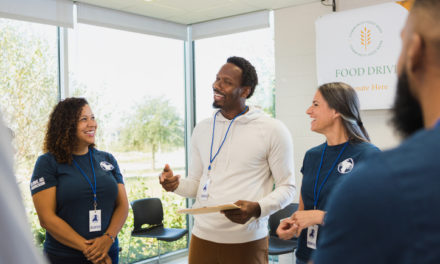
There are many reasons I look forward to autumn in New York: the crunch of dried foliage beneath my feet in Central Park; the theatrical fun of the pop-up dinner party Le Dîner en Blanc commandeering the streets of Manhattan with its gorgeously eclectic crowds; memories of the joyous fall wedding in Bryant Park my husband and I toast to on our anniversary; and the anticipation that builds after booking the local play gym for our son’s perennially action-packed birthday party, which adds yet another layer of excitement to a social season a friend recently dubbed as “Bridgerton, but with kids’ birthday parties instead of balls.”
I intentionally keep these positive experiences top of mind because this time of year can also be very stressful for me — particularly when it comes to sending my son back to school and navigating the complexities of special education. Whenever there’s a transition in services, whether it’s specific to preschool or turning 5, it involves marshaling what feels like a village of people to ensure that everyone does their part, including: the school, the city department of education, the service providers, our family, our friends, and ourselves. When there are holes in the service schedule — which happens often during transitions when a family is new to a system and there is a shortage of providers — finding and coordinating coverage becomes a matter of urgency that ultimately falls to my husband and me if we want to minimize the negative impact on our son.
In our case, this has involved summoning all of our bandwidth to explore a multitude of fixes. These have included changing our son’s insurance provider so that services can be covered by our local hospital; asking family and friends for help, referrals, and advice; consulting teachers, school administrators, and lawyers; interviewing several options for temporary aides, contacting their references, and setting up trial runs with our son; paying out-of-pocket for evaluations and private specialists; and endlessly following up via email, phone, and in person with bureaucrats (who are themselves overwhelmed with a flood of new cases at the beginning of the school year). While it is exhausting work and fraught with the additional pressures of balancing full-time jobs, the needs of aging parents, and our own physical and mental health, my husband and I are motivated to press on because we love our son and want to do everything we can to help him during this critical period of his growth and development.
When it all gets to be too much, reading is my ADHD brain’s favorite way to escape, so I often turn to new books and research to refresh my perspective. Right now, that includes gleaning inspiration from The Progressive Parent: Harnessing the Power of Science and Social Justice to Raise Awesome Kids by science journalist Kavin Senapathy, whose clear-eyed reporting has helped me strive for radical inclusion on behalf of my son. Another reading that has recently resonated with me is the U.S. Surgeon General Dr. Vivek Murthy’s advisory advocating for parents’ mental health and well-being, “Parents Under Pressure,” which recognizes the plight of modern-day parenting as a critical public health issue. According to the American Psychological Association, a whopping 48% of parents say that their stress is completely overwhelming most days, compared with 26% of other adults. This can adversely affect the mental health of children who are the very future of our society, and the problem has gotten worse over time, with new challenges presented by technology, social media, and what Dr. Murthy calls “an epidemic of loneliness.”
“With this Advisory, I am calling for a fundamental shift in how we value and prioritize the mental health and well-being of parents,” said Dr. Murthy in the advisory’s announcement. “I am also outlining policies, programs, and individual actions we can all take to support parents and caregivers,” including guidelines for governmental agencies, employers, community organizations, schools, health and social systems, researchers, family and friends, and parents and caregivers. This emphasis on an all-hands-on-deck approach especially rings true for me, given the diverse network my husband and I regularly rely on to help with our son. And it speaks to the heart of Dr. Murthy’s message: Every parent deserves access to support.
In the workplace, employers can make a meaningful difference by heeding the Surgeon General’s calls for expanding policies and offerings that specifically support parents’ well-being. Not surprisingly, many of these suggestions also benefit those who are not parents. These include:
- paid parental, medical, and sick leave
- flexible and fair work schedules
- access to child care on site or in the community
- implementing training for managers to help them recognize stress and mental health challenges and promote work-life balance
- actively including parents in leadership roles so that they can support the well-being of other parents in the workplace
- providing access to high-quality mental health care through health insurance and confidential counseling services, such as those offered through Employee Wellness Programs (EWPs) and Employee Assistance Programs (EAPs)
I am fortunate to work for a firm that recognizes the value of self-care and offers much of the above to help with achieving work-life balance and staving off stress — even going beyond with an annual winter shutdown, summer Fridays, and quarterly wellness days in addition to vacation and sick time. Our insurance has given me access to mental health care and our Holisticly wellness subscription keeps me stocked with helpful audiobooks through Audible credits and meditation exercises on Headspace. And that generous time-off policy? It’s been a source of much-needed peace. Thanks to this perk, I’ve been able to carve out time to participate in weekday outdoor classes with my son — a respite from the constant thrum of school-related discussions and juggling provider schedules that often fills my free time.
Run by the thoughtful team at Brooklyn Forest, these early childhood classes allow me to slow down and be present with my boy as we play in the dirt and go for winding, tree-lined nature walks through Central Park. Wandering the canopied trails with my son, I’m reminded of this eloquent passage in Senapathy’s book: “Raising our children to be their most authentic, expansive selves is a testament to that human penchant to have hope and love for all the children who will take the mantle, in our own lifetimes, and generations after our bodies have returned to dust and our spirit is released into the universe.”
It’s not all sun-dappled strolls for us, of course; there are still meltdowns and shoes that get kicked off that need to be put back on. But in those moments, in the calm, beautiful quiet of the woods, I’m learning to meet my son where he is and to really listen to what he needs. And that is a precious gift in itself.



















